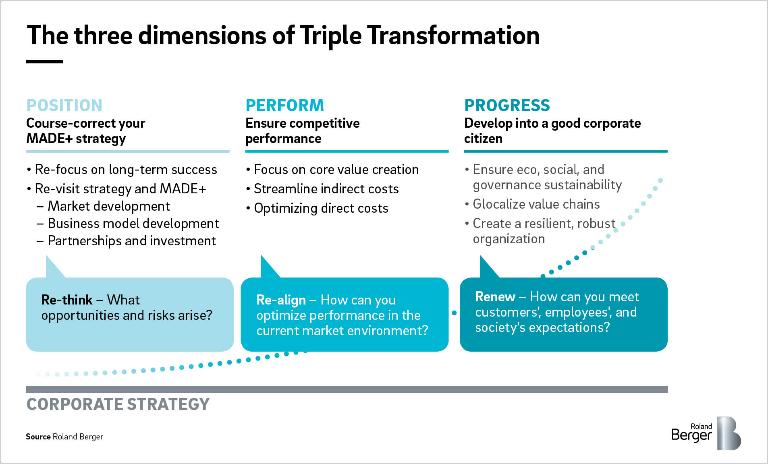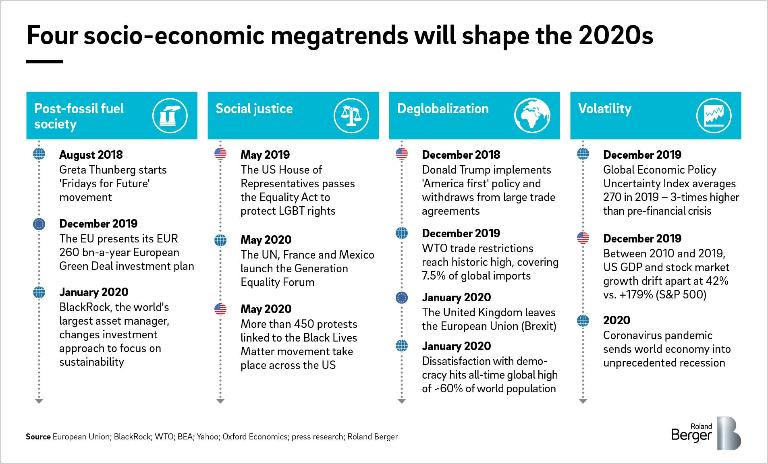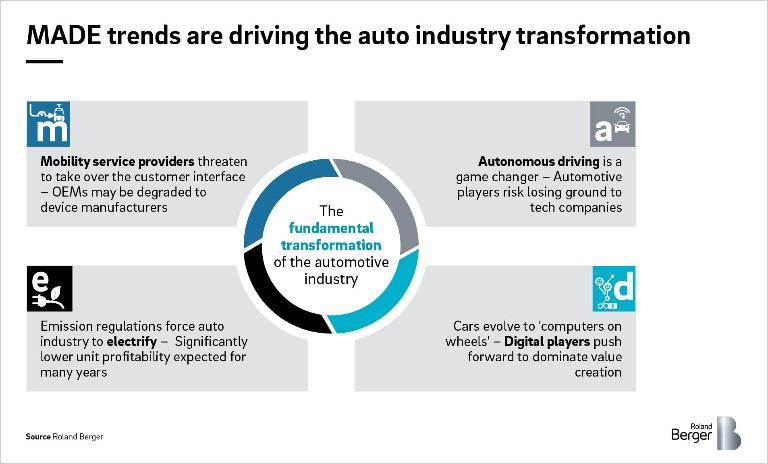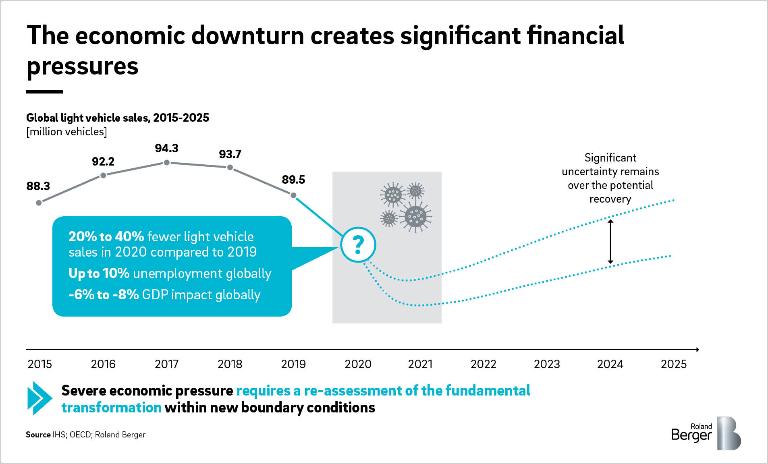

Triple Transformation: A framework for the auto industry in the 2020s
How decision makers can overcome today’s challenges and Position, Perform and Progress
From Covid-19 to deglobalization and the shift towards sustainable mobility, decision makers in the automotive industry are facing unprecedented challenges. They need to re-align their strategy to the biggest technological change in history, increase performance to survive the most severe post-war downturn on record and develop high standards of sustainability, inclusion and good citizenship. Roland Berger’s Triple Transformation framework helps to address these challenges, enabling managers to re-align and ensure profitability in the next decade.
There’s little doubt that the auto industry is experiencing an unprecedented level of complexity. It is already in the midst of a fundamental shift away from conventional vehicles towards the trends of Mobility, Autonomous driving, Digitalization and Electrification (MADE) . And now it is also being battered by a severe economic downturn driven by the coronavirus crisis, as well as destabilizing megatrends such as deglobalization and the UN-backed drive towards sustainability.

Triple Transformation proposes a framework to help senior automotive executives navigate the complexity and bring order.
Such challenges require decisive action. But this is not a time for PR exercises or non-strategic investments in the latest trend. It is a time for a complete re-evaluation of corporate strategy.
Our experience suggests that many decision makers are overwhelmed by this turbulent and unprecedented situation. How can costs be reduced to cope with the drop in sales? Which parts of our strategy are still valid? How can supply chains be stabilized? How can we still maintain long term attractivity for investors and employees?
Our Triple Transformation framework focuses on three key dimensions that are crucial to overcoming today’s challenges, namely Position, Perform and Progress. These enable automotive OEMs to course-correct their current strategy if necessary, ensure competitive performance and become a leading corporate citizen.
1. The new decade poses significant challenges for corporations
We see three key challenges facing the auto industry over the coming decade. The first is a set of four socio-economic megatrends that will shape the 2020s. The shift towards a post-fossil fuel society is arguably the most important, with major developments such as the Fridays for Future climate movement, the EU’s one-trillion-euro Green Deal investment plan and a new ‘sustainability first’ focus among investors reflecting societal pressure for a carbon-neutral future.
Growing demands for social justice, with the Black Lives Matter movement currently the most prominent, is another notable megatrend. Deglobalization, driven by trade wars, protectionist policies (such as America First) and nationalist policies (for example Brexit), is a third.
Most importantly, volatility is at an all-time high: economic uncertainty was already at record levels before 2020, stock markets are rollercoasting and the Covid-19 pandemic could see global GDP slashed this year.
2. The coronavirus crisis has not halted the fundamental transformation of the auto industry
In addition to these global megatrends there is the automotive industry’s own transformation. The shift away from traditional, privately owned and conventionally powered vehicles to future mobility types is unstoppable, and many incumbent OEMs are still behind the curve. Roland Berger’s MADE trends highlight the difficulties.
New mobility service providers threaten to wrest away the customer interface, downgrading OEMs to mere device manufacturers. At the same time, they face losing ground to tech companies on autonomous driving and digital players when it comes to future value creation. Additionally, electric vehicles currently offer significantly lower profitability, but are key to meeting CO2-emissions legislation in many markets.
3. The economic downturn will limit the financial capabilities of companies for years to come
Lastly, the current severe economic downturn means auto companies must completely reassess how they will transform, as their ability to finance the shift declines. In the short term, 20 to 40% fewer light vehicles could be sold in 2020 compared to 2019 due to the ongoing crisis and, longer term, there is significant uncertainty about when pre-2020 sales levels will be achieved again.
Triple Transformation
Triple Transformation offers a way through these challenges. It proposes a framework to help senior automotive executives navigate the complexity and bring order to the decision-making process, enabling effective solutions. It is based along three dimensions:
- Position: Re-think your strategy in light of current challenges and long-term goals. In particular, re-visit solutions to the MADE trends, based on a realistic market development view, and re-assess business models, partnerships and investments. For example, how can investments in mobility services finally be made profitable? Can self-developed L4/L5 solutions be competitive? Are new partners needed? Can other business models like "battery-as-a-service" offer profit potentials? And how can the transformation into a software-enabled company succeed?
- Perform: Realign your business to focus on the core of value creation and ensure competitive performance. Streamline indirect costs to cut out slack and optimize the direct costs of value-creating activities. How can product and option portfolios be radically streamlined? How can complexity be holistically assessed, managed and reduced? And how can the automotive distribution system finally be made more efficient, value-adding and digital?
- Progress: Renew your organization to meet the expectations of customers, employees and society. Improve environmental, social and governance sustainability and develop more flexible value chains. Build an organization than can weather volatility and become a good corporate citizen. Installing a governance system around the well-established ESG framework can be one important measure. But it doesn’t stop there. Which UN sustainability goals should the company contribute to? How can the organization eventually become carbon neutral? And how can it become more resilient against short-term, high-impact environmental changes while increasing diversity and inclusion in the workforce and management?
Now is the time for decisive action. Roland Berger offers a toolbox of products to successfully deliver Triple Transformation. Whether it be a comprehensive evaluation of corporate strategy in the ‘new normal’, identifying cost reductions or improving sustainability, we can tailor make solutions to exceed your requirements. We will publish more details shortly, but in the meantime, feel free to get in touch.








